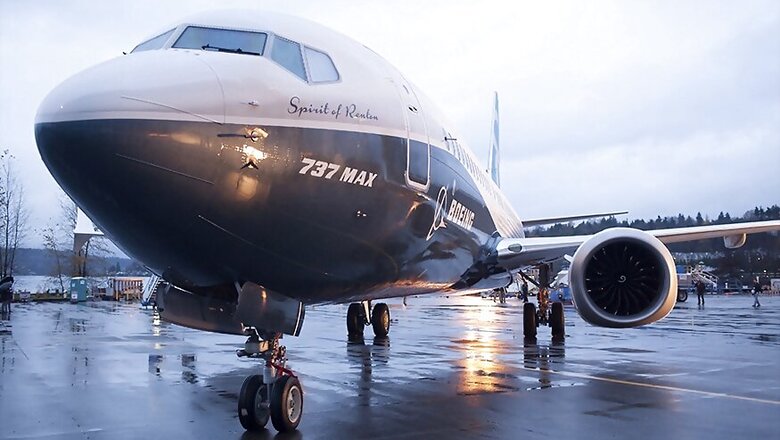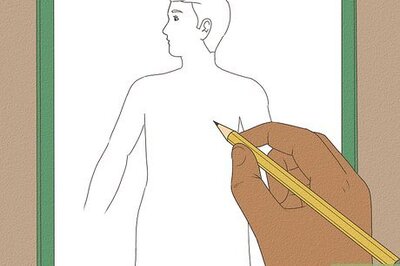
views
The top US air transport regulator on Wednesday doused Boeing's hopes that its 737 MAX will return to the skies this year while lawmakers probed why the agency failed to ground the plane after the first of two tragic crashes. In an interview just ahead of a congressional hearing, Federal Aviation Administration chief Steve Dickson told CNBC the aircraft will not be cleared to fly before 2020.
The MAX has been grounded since March following the second of two crashes that killed a total of 346 people. The process for approving the MAX's return to the skies still has 10 or 11 milestones left to complete, including a certification flight and a public comment period on pilot training requirements, the FAA chief said. "If you just do the math, it's going to extend into 2020," he said. Boeing has been aiming to win regulatory approval this month, with flights projected to resume in January.
But Dickson said, "I've made it very clear Boeing's plan is not the FAA's plan." Many of the questions at the hearing by the House Transportation Committee focused on why the FAA did not move more aggressively after the first crash in October 2018. Boeing and the FAA have been under intense scrutiny for their responses to issues with the aircraft, including the flight-handling system involved in both accidents, the Maneuvering Characteristics Augmentation System, or MCAS. Rather than grounding the plane after the Lion Air crash, the FAA did not move until after the Ethiopian Airlines tragedy in March.
In the interim, the agency required Boeing to revise the MCAS flight handling system in a process overseen by the FAA and issued guidelines to flight crews worldwide on how the respond to a problem with MCAS, an automated system the Lion Air pilots were unable to control. At Wednesday's hearing, Representative Peter DeFazio, an Oregon Democrat leading a congressional probe, cited an internal FAA risk analysis that found that without fixes to MCAS, the MAX could suffer as many as 15 such catastrophic accidents over its decades of expected use.
That is a much higher rate than other planes and aviation experts consider it unacceptable. Dickson, who did not join the agency until this summer, following the two crashes, said he did not know who at the FAA saw the internal analysis but the agency's decisions after the Lion Air crash were "data driven." "We really didn't know what the causes were" of the Lion Air crash, Dickson said, adding that issues with aircraft maintenance and pilot performance were also factors besides the MCAS.
"Obviously the result is not satisfactory," Dickson said when pressed if the agency had made a mistake. "The decision did not achieve the result it was intended to achieve." DeFazio hit back, saying the FAA's response was "way less than not satisfactory... it was catastrophic." He again raised the issue of FAA inspectors being too close to the aircraft manufacturer, referring to FAA officials in Seattle who on key decisions deferred to Boeing during the MAX certification.
"We may have a captive regulatory problem in the field offices," DeFazio said. A Boeing spokesman said the company agreed with the FAA's response to the Lion Air crash. But Michael Stumo, whose daughter Samya was killed in the crash in Ethiopian, said the internal analysis showed the FAA's claims its decisions were data-driven are "garbage." "That decision to ignore the risk assessment that this is the most dangerous plane in history killed my daughter," Stumo said in a phone interview from Washington.
Following Dickson's testimony, the panel heard from Edward Pierson, a former senior manager at Boeing whose pleas to company brass to address production problems fell on deaf ears. Pierson described the Renton, Washington factory as being in "chaos," with excessive overtime stressing operations and raising questions about plane safety. He also cautioned that the MAX's travails go beyond the MCAS, noting that a factor in both crashes was an angle of attack sensor that misread flight conditions.
"Although it is imperative to correct Boeing's flawed MCAS software and pilot training, it is no less imperative to thoroughly evaluate why the AOA sensors provided faulty data in the first place and whether those reasons implicate Renton production more broadly," he said. Dickson defended the agency, rejecting the idea the system was "broken," but said he was determined to improve the agency's operations to prevent future crashes.
The accidents showed problems with "fragmented and inadequate" communications at the agency that inhibited the agency's ability to comprehensively assess safety during certification.
Shares of Boeing ended up 0.6 percent at $350.00.

















Comments
0 comment